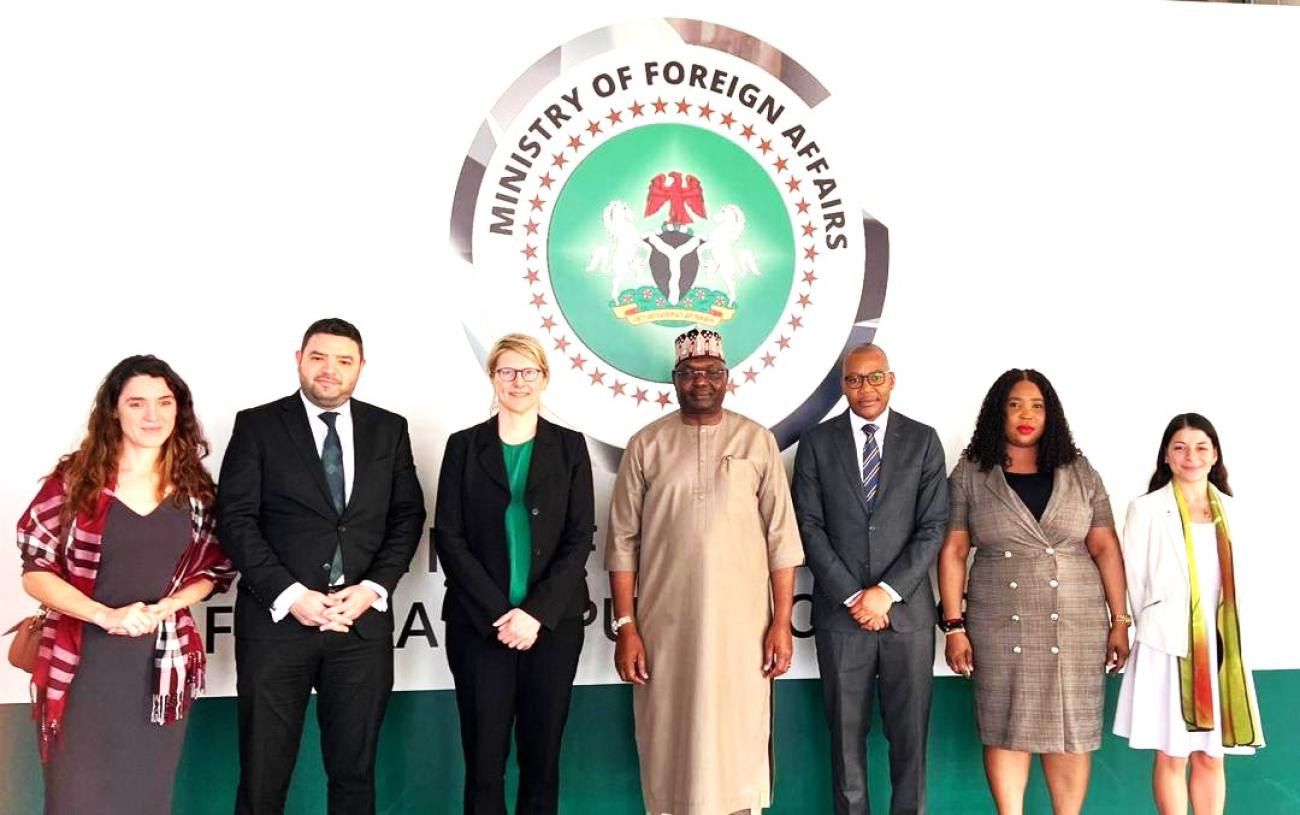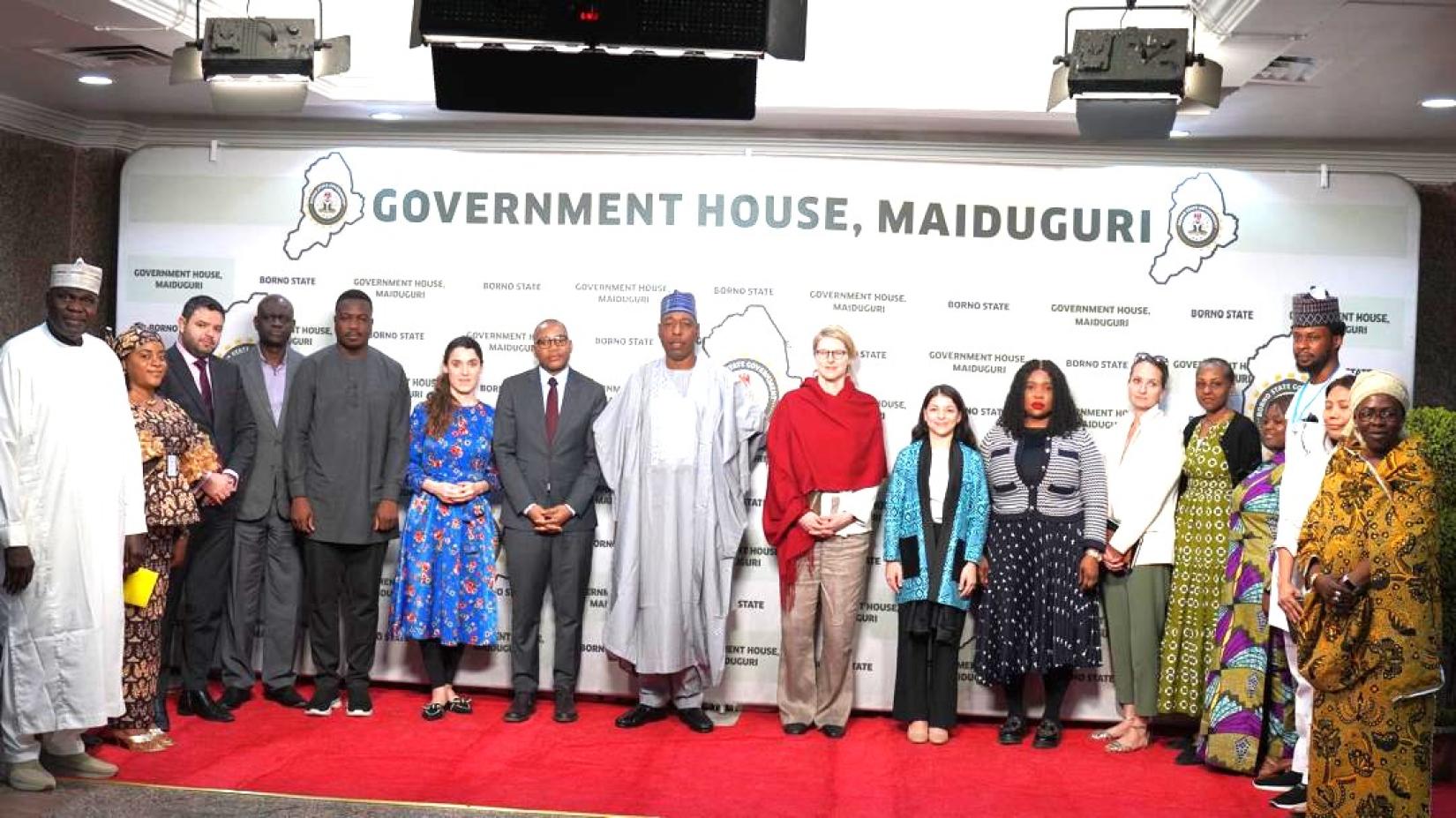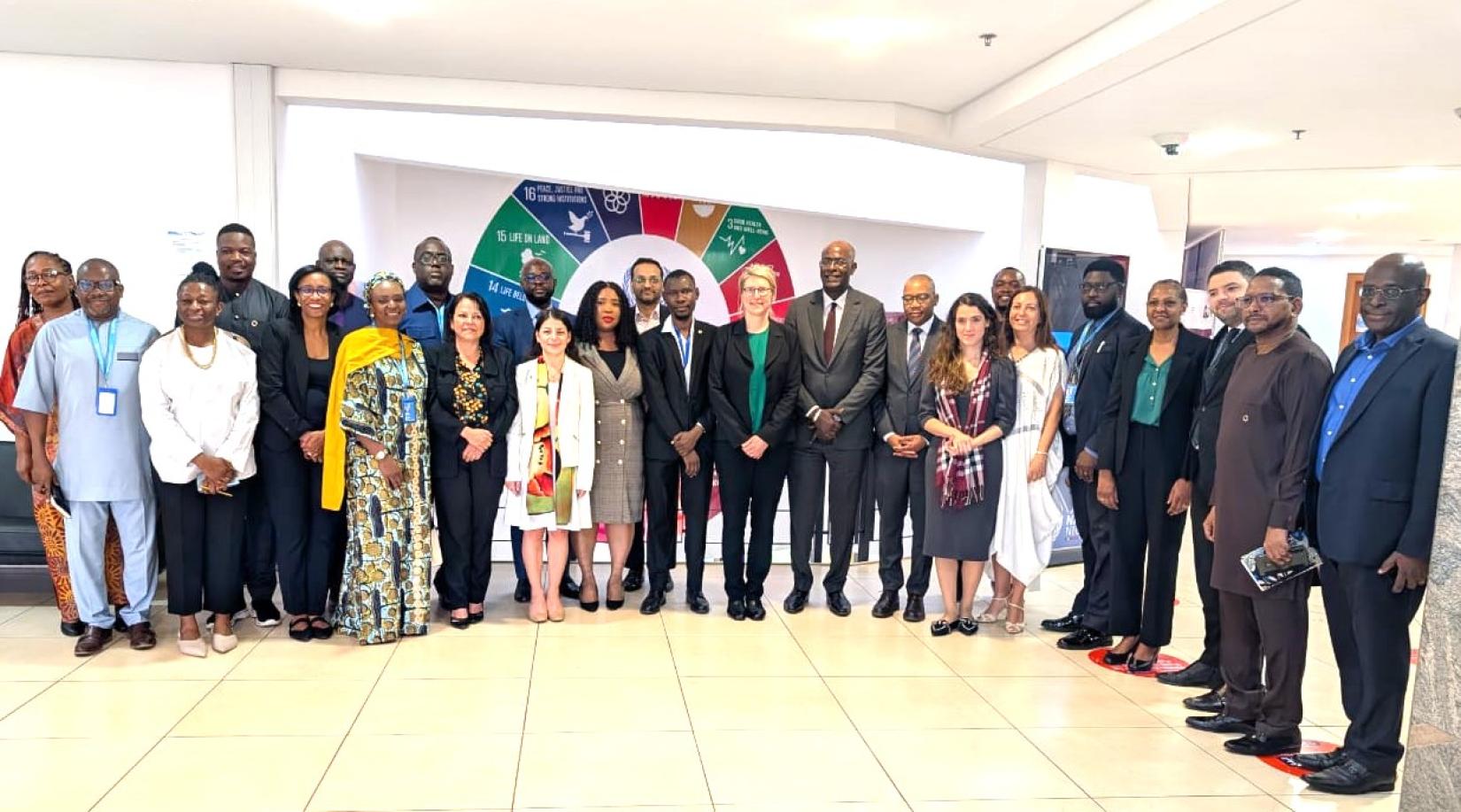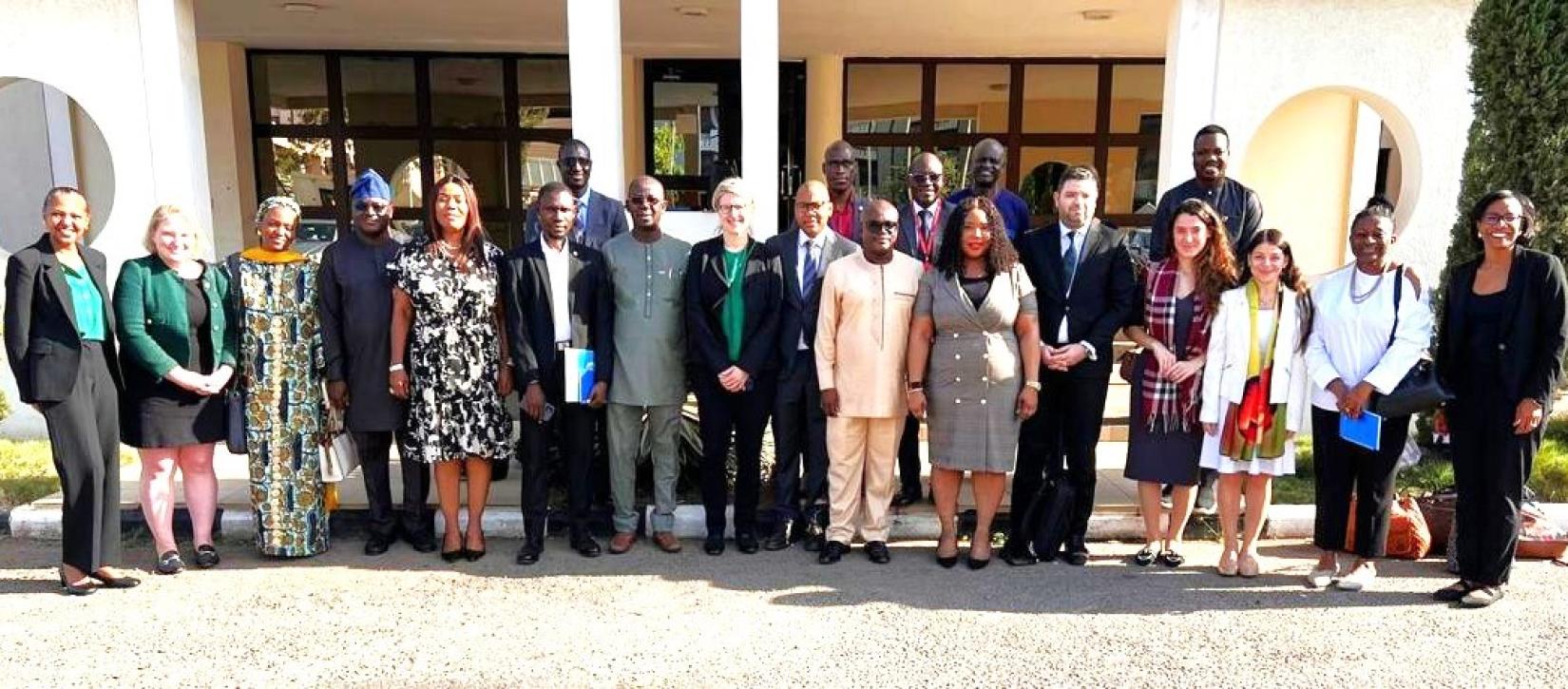UN Security Council Informal Group visits Nigeria, addresses Climate, Peace, and Security Challenges in Lake Chad basin

The delegation held crucial meetings with various stakeholders, including government representatives, international organizations, and local leaders.
Members of the Informal Expert Group on Climate, Peace, and Security (IEG) of the United Nations Security Council embarked on a five-day informal mission to Nigeria, in December 2024, focusing on the complex challenges of the Lake Chad Basin region. This mission, the first field visit for the group, aimed to assess the localized impacts of climate change on peace and security, providing a direct look at how these issues affect communities, particularly in the North-East of Nigeria.
The purpose of the mission was for the members to learn about the reality and localized impact of climate, peace and security related to the specific context of the Lake Chad Basin region, and to familiarize the Security Council membership with the practical implications on the ground on language related to climate change and its impacts on peace and security used in mandates and presidential statements, and to directly see and learn about the needs and realities faced by affected communities, including women, children and youth. The Mission also sought to review how recommendations from UNSC resolutions, such as Resolution 2349 (2017), have been implemented in the Lake Chad Basin region, particularly regarding climate change, humanitarian aid, and security stabilization.
The timing of the mission is particularly significant, as the UN Security Council has been increasingly focused on addressing the intersection of climate change and security in the Lake Chad Basin region. In 2017, the UNSC adopted Resolution 2349, which recognized the link between climate change, violent extremism, and the humanitarian crisis in the region. More recently, in 2024, the UNSC issued a Presidential Statement on West Africa and the Sahel, acknowledging the role of climate change in exacerbating conflict and emphasizing the need for long-term stabilization strategies.

The mission took place amid growing concerns about the continued impact of climate change on the region’s security and development. The region's vulnerability to extreme weather events, such as floods, droughts, and desertification, is compounded by political instability and violent extremism, making it one of the most fragile areas in the world.
This year, the group was co-chaired by Mozambique and Switzerland who invited other Council Members to join the co-chairs for a field visit. Representatives of Algeria, France, Malta, Mozambique, Sierra Leone, Slovenia, Switzerland, and the United Kingdom, and the United States joined the visit.
While the group acknowledged the immense challenges faced by the region, the mission also emphasized the importance of focusing on solutions. This approach called for partnerships across sectors, governments, and generations to foster long-term stability and resilience.
The delegation held crucial meetings with various stakeholders, including government representatives, international organizations, and local leaders.

During their meeting with the UN Resident Coordinator, Mr. Mohammed Malick Fall, the UN Country Team including the World Bank, the representatives learnt about initiatives and programmes in the North-East of Nigeria and beyond undertaken by the different UN entities to address the root causes and challenges related to climate change, security, peacebuilding, humanitarian emergency, and how durable solutions and longer-term development can be enhanced.
The IEG also met with Nigeria's federal and state government officials, including those from the Ministry of Foreign Affairs, the National Council of Climate Change (NCCC), the National Counter Terrorism Centre (NCTC), Office of the National Security Advisor, and the Institute of Peace and Conflict Resolution (IPCR). Discussions focused on the intersection of climate change, conflict, and peacebuilding, as well as the role of early warning systems and data-sharing mechanisms at regional, national, and local levels.
The Executive Secretary of the Lake Chad Basin Commission (LCBC), Ambassador Mamman Nuhu, briefed the delegation on the challenges of climate-induced displacement, particularly among farmers and herders, and the impact of climate change on local security dynamics. The LCBC's dual mandate in both security and development, along with its collaboration with the Multi-National Joint Task Force (MNJTF), was highlighted as a key mechanism for addressing these challenges.
Representatives also met with local civil society organizations working on climate resilience and peacebuilding projects. These engagements underscored the importance of locally led solutions, particularly in fostering climate-resilient livelihoods and raising awareness on the impacts of climate change. The role of women and youth in mediation, peace education, and local conflict resolution was also a focal point.
The group was briefed by ECOWAS on their Regional Strategy on Climate Change and the revisions to the Transhumance Protocol. Discussions also included how climate change impacts, such as drought, desertification, and flooding, affect migration patterns and resource conflicts between farmers and herders.

A two-day field visit to Maiduguri, Borno State, provided the delegation with a firsthand look at the challenges faced by communities in the heart of the Lake Chad Basin region. During this visit, the delegation met with Borno State Governor, Professor Babagana Umaru Zulum, and his cabinet to discuss the ongoing efforts to stabilize and rebuild the state after years of conflict. Key topics included the need for durable solutions to internally displaced persons and the role of regional cooperation in promoting social cohesion and resilience.
The upcoming Lake Chad Basin Governors Forum 2025 will be a key moment to deepen further engagement, including on implementation of the recently revised Regional Strategy for the Stabilisation, Recovery and Resilience of the Boko Haram affected areas of the Lake Chad Basin region. The importance of a regional approach to strengthen the social cohesion of the Lake Chad basin countries was also, including the role of the regional stabilization basket fund as well as the basket fund related to territorial action plans. Questions arose related to the access of funding of the Green Climate Fund.
The delegation also visited IDP camps in Maiduguri (Muna Garage and Bulumkutuu Interim Care Centre-BICC) and in Jere LGA (El Miskin IDP Camp), where they observed the dire humanitarian conditions and the ongoing challenges posed by climate change, including food insecurity, water scarcity, and infrastructure damage. The importance of education and vocational training for youth to prevent recruitment by armed groups was also emphasized.
The IEG's mission to Nigeria highlighted the urgency of addressing climate change as a driver of conflict and insecurity in the Lake Chad Basin region. However, it also showcased the potential for regional cooperation, innovative solutions, and community-led initiatives to build resilience and promote peace. The mission underscored the importance of continued engagement with local actors, international partners, and governments to tackle the intertwined challenges of climate change, conflict, and development.
As the region continues to face significant environmental, political, and security challenges, the need for integrated, long-term strategies that combine climate adaptation, conflict prevention, and development will be critical to ensuring a sustainable and peaceful future for the Lake Chad Basin.Top of Form
The Mission was accompanied by the Climate Peace and Security Advisor of the United Nations Office for West Africa and the Sahel (UNOWAS), Mr. Galine Yanon, the Climate, Peace and Security Advisor of the United Nations Office for Central Africa (UNOCA), Mr. Mabaye, the Peace and Development Advisor for Nigeria, Ms. Kimairis Toogood, and Climate Peace and Security Officer at the Department of Political and Peacebuilding Affairs, Western Africa Division (DPPA-WAD), Ms. Wifag Hadra.
Background
The Lake Chad Basin faces a complex crisis fueled by environmental, political, security, and socio-economic challenges that undermine stability and development. In the sub-region, climate-related challenges intertwine with a complex security situation marked by other forms of localized conflicts, political crises, violent extremism, and terrorism, and clashes over resource control. The region is facing a multidimensional crisis, with two of its four member countries, Chad and Niger, ranked among the top seven most vulnerable countries to climate change.
As a result, the region is very susceptible to recurrent droughts, flood, land degradation, and erratic rainfall patterns, with severe consequences for agriculture and water resources, contributing to food and water insecurity, migration and displacement.
While climate change is not the sole cause of conflict in the Lake Chad Basin region, it acts as a significant "risk multiplier," exacerbating existing tensions amongst communities, that contribute to instability and conflict.
UNSC Resolution 2349 (2017) (S/RES/2349) adopted unanimously by all Council members addressed for the first time holistically issues related to violent extremism and the security crisis together with the humanitarian emergency, development deficits and recognized the adverse effects of climate change and ecological changes among other factors on the stability of the region, including through water scarcity, drought, desertification, land degradation and food insecurity and emphasized the need for adequate risk assessments and risk management strategies.
On 24 May 2024, under the co-penholdership of Sierra Leone and Switzerland, the UN Security Council adopted by consensus a Presidential Statement on West Africa and the Sahel in support of the United Nations Office for West Africa and the Sahel (UNOWAS), which also specifically refers to the effects of climate change (S/PRST/2024/3) . Similarly, on 1 November 2024, under the co-penholdership of Mozambique and the United Kingdom, the UN Security Council adopted by consensus a Presidential Statement on the Central African region in support of the United Nations Office for the Central African region (UNOCA) in document (S/PRST/2024/7).
Written by




